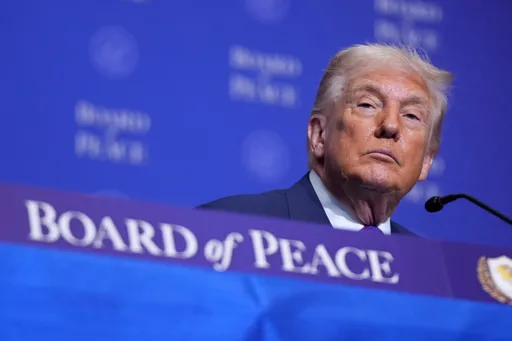Leaked WhatsApp group chats belonging to the Alternative for Deutschland (AfD) party present a damning indictment of German politics. As far-right sentiments have been on the rise in Germany and across Europe over the last few years, the country's politicians have long had a laissez-faire attitude towards an issue that could become a national emergency.
Rights groups have noted record-breaking numbers of far-right attacks against ethnic and religious minorities last year. According to the government's own statistics, 23,000 far-right extremist attacks were recorded in 2020 – nearly 20 percent more than the year before.
But the leaks also paint a picture of serious concern to the government as 76 of AfD's 92 members of parliament were also members of the WhatsApp group in question.
Among the topics discussed were “regime change” through economic collapse and calls for former Chancellor Angela Merkel to be “jailed for life.”
A senior party official wrote, “Germany for the Germans" and suggested offering a training course on the topic "Expansion of the external borders!?" – echoing common neo-Nazi slogans.
But the AfD is no stranger to controversy; its leadership has a long record of making controversial statements in the past, some bordering on criminality.
These leaked statements present a direct challenge to German democratic values. While the German Foreign Minister, Annalena Baerbock, is about to pay an official visit to Türkiye, people in Germany of Turkish origin live in fear of far-right attacks.
In a press release before setting off on her trip, Foreign Minister Baerbock said, “A German and a Turkish heart beat in millions of people in Germany. Gone are the days when this was seen as a problem.”
Her sentiments might be sincere, but the image of Germany she paints couldn't be further from the truth. The Turkish Association of Germany repeatedly calls for equal opportunities, stricter laws against discrimination, and better protection from far-right attacks.
One in every five people in Germany comes from a migrant background, and many openly voice little to no trust in government institutions when it comes to being treated as equals to their white counterparts.
Mitigating the risk of far-right attacks poses a real challenge to the left-wing coalition government, which is under pressure to implement its 10-point action plan against the far-right.
But many observers of German politics say there are fears of a violent backlash from the far-right that are clearly validated by the leaks – fears that deep-seated political divisions where the far-right is willing to use violence are plausible.
In 2019, a German politician who had spoken in favour of refugees arriving in Germany was shot dead by a far-right extremist at his home. A few months later, in 2020, another far-right extremist shot and killed 11 people in the town of Hanau, with almost all victims coming from migrant backgrounds.
In scenarios of political division, it’s often the most vulnerable in society who become easy targets. Fears of far-right political groups radicalising and taking up violent actions are fast becoming manifest realities.
Staff at some of Germany's major mosques have been in consultation with security services to train on how to react in the event of a far-right terror attack. In some cases, mosques have even shared their building plans with security services should far-right terrorists attack the mosque and take hostages.
Over the years, German security services have, in several raids, recovered dangerous weapons – including various types of guns and bomb-making equipment – from far-right extremists who intended to use them to incite civil war within Germany. Some of the more alarming arrests were made within the German military's special forces.
During the Covid-19 pandemic, these political divisions only deepened, with the far-right charged with conspiracy theories and ill-informed views that inspired and catalysed hundreds of protests across the country calling for the termination of all Covid-19 restrictions.
While the AfD has been proscribed as a 'suspicious entity' by a German court and there are calls for it to be placed under surveillance, the outlook for Germany's internal politics is poor, with a nearly 30 percent rise in the cost of domestic gas and electricity, severe food inflation, rising fuel costs and overall stagnating economic growth, further calls for the government to go are likely.
The European Stage
While on the domestic front, the politics of the AfD threaten Germany's historic political stability, on the European stage, Germany's influence has been dealt a few severe blows over the last several years, with the Syrian refugee crisis marking the beginning of the end of Germany's leadership in Europe.
Strong resistance from countries such as Hungary and Poland to accept Muslim refugees from Syria and Iraq left Germany in an awkward position.
Many years later, the refugee crisis has died down, but Hungary and Poland have yet to be sanctioned or penalised – casting light on Germany's receding power in Europe.
The more recent war in Ukraine has revealed Germany's waning influence in Europe.
Germany's attempt to mitigate the domestic risk of punishing Russia too harshly exposes its vulnerabilities to its European friends and partners.
German Chancellor Olaf Scholz was initially hesitant to send military aid to Ukraine, citing negative consequences for his country, such as the immediate cessation of access to all Russian gas, which is a lifeline for German industry.
While Eastern EU member states such as Latvia and Poland are feeling the heat of the war in Ukraine, many are taking note of Germany's hesitance in dealing harshly with Russia. And according to some analysts, Germany's willingness to pay for Russian gas in roubles is further risking Germany's reputation.
This chasm also affects Germany’s influence in countries that are falling out of step with the EU on other issues.
For example in Poland, judicial reforms rejected by the EU for being 'undemocratic' have inadvertently blocked billions of euros of funding from the EU to Poland. Germany would previously have had a seat at the table in resolving these issues, but with Poland feeling hard done by due to Germany's weak response to Russia, it would be difficult for German officials to take the high moral ground or have enough political capital to convince Warsaw to drop the controversial reforms.
Hungary's President Viktor Orban expressed interest in increasing Russian gas imports to the country. But a weak German response following Orban's lurch towards far-right politics in the recent past has allowed him to make decisions that stray from the EU's policy guidelines.
Any future EU attempts to force Hungary to move its economic dependency away from Russia will invariably result in Hungary claiming it was merely following a path set by Germany.























